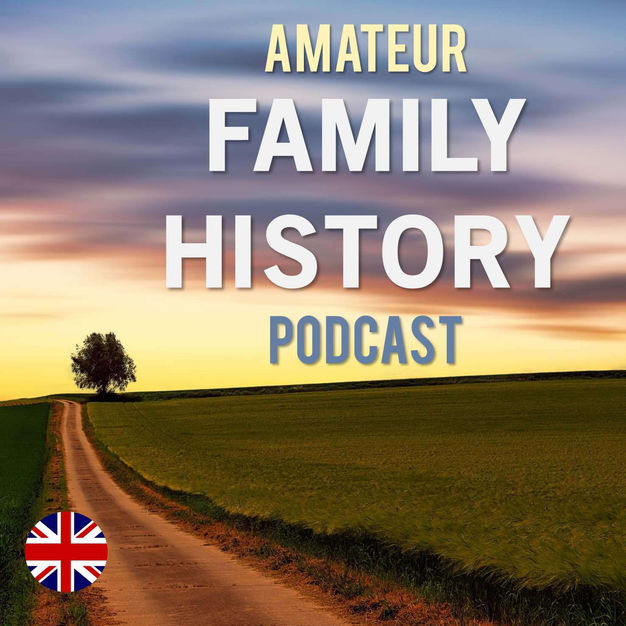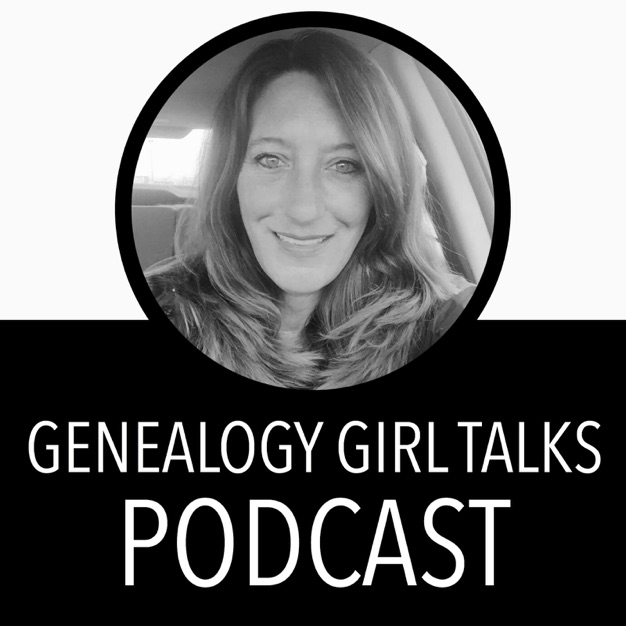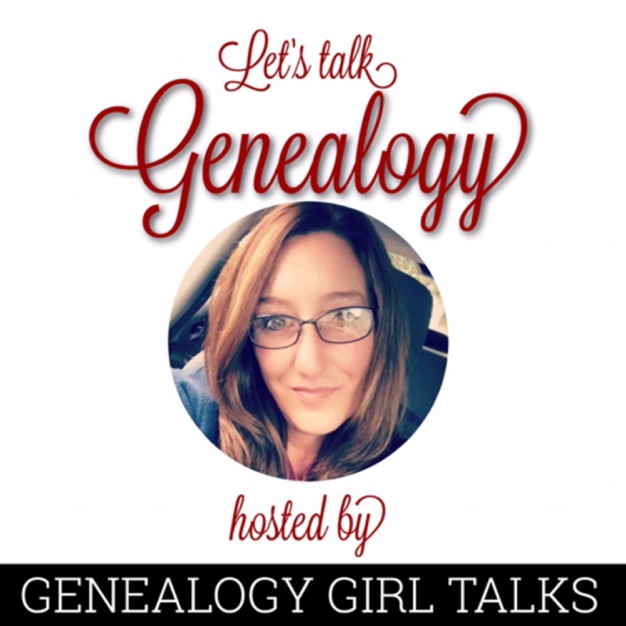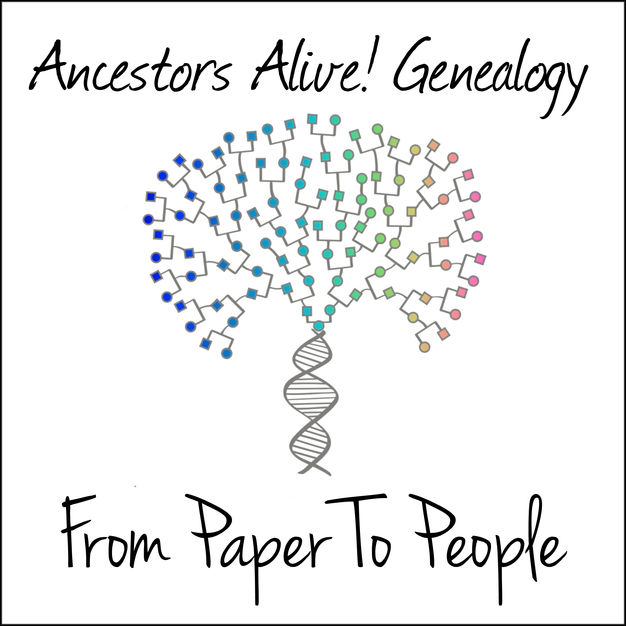
Amateur Family History Podcast (UK)
Andy Holmes
A series of podcasts about the basics of UK family history. Early episodes are a 'how to' guide covering the basics. Contributions are welcome for later episodes to cover more advanced techniques and more in-depth genealogical topics. Please contact [email protected]
- 28 minutes 38 secondsEpisode 33 – The 1921 Census: a first look
After much hype and anticipation, the 1921 census is finally here.
The last census to be published for a few decades (listen to Episode 32 to find out why), this snapshot into the post-WW1 life of our ancestors will be sure to add to your research and help build a picture of your heritage.
Available initially on a pay-per-record basis, I take a first look at the records of my ancestors, and share my thoughts of the hotly anticipated world of the census, the website/searching experience, the value for money, and the information you can glean.
With there being a cost for these records, it’s important that you know what you’re getting, and I’ll give details of what you can see for free, and what you get from paying out for either the transcription or the record image. (Please remember this is only my experience, and you are – or course – responsible for any purchases you choose to make).
This episode is published as soon as practically possible after the release of the census on 6th January 2022, and more details will follow as I explore the records more deeply.
If you unearth any golden nuggets of information about your family free from the 1921 census, please don’t hesitate to get in touch – or if you have any hints and tips on getting the most from the website. It’d be great to her from you.
In the meantime – happy census-searching!
Recommended drinks to accompany this episode: Anything caffeinated. I feel a lot of research coming on.
Recommended biscuits accompany this episode: Whatever’s left over from Christmas.
Listen now
6 January 2022, 2:07 am - 33 minutes 23 secondsEpisode 32 – The 1921 census: a look ahead
Well, this is timely, isn’t it? Just a day after I recorded this episode, the National Archives announce the date of release of the 1921 census. That’s why I’m publishing it today!
This genealogical mine of information will be released on 6th January 2022, and will be available on Find My Past.
When I recorded this episode, we didn’t know the date of release, other than it being “Early 2022”, but now we have something to look forward to after the excitement of Christmas has died down.
In this episode I look at some ways in which we, as genealogists, can prepare for the release of the 1921 census, and the sorts of things that it’ll contain, and how we can use it.
I’ll also take a look at your comments and thoughts on the upcoming release, and get a feel for what you are looking forward to finding out.
Please remember that this episode was recorded a day before the release date was announced, and – no doubt – other information will be coming out too soon… so, apologies if anything has been superseded. I’ll update anything that may be ‘breaking’ in a future episode.
In the meantime, I hope you enjoy my meander through the many aspects of the census, and look forward to hearing your comments and receiving your emails.
Recommended drinks to accompany this episode: Champagne! To celebrate a nice new chunk of genealogical records.
Recommended biscuits to accompany this episode: Molasses Cookies. Apparently, as a substitute for sugar, molasses was used in lots of 1920s baking.
Listen now
27 October 2021, 9:17 pm - 27 minutes 25 secondsEpisode 31 – Family History Societies: Part 2 (and other stuff besides)
Welcome back to the latest installment of the Amateur Family History Podcast – and the second part of my chat with Margaret Roberts of the Cheshire Family History Society.
Last time, we talked about what Family History Societies do, how to get involved, and how they can help you to break down your genealogical brick walls.
In this month’s episode, we pick up where we left off, but bounce around a few more genealogical topics, that – hopefully – will make you think of new and different ways to approach your research.
I also share some hints and tips from listeners on how they have managed to make progress – using techniques and resources that I also discuss with Margaret.
I’m also looking for your help on a future episode, where I preview the world of the 1921 census, due for publication in a few months’ time. Details are at the end of this episode.
So, this episode is something of a mixed bag – but I hope you find it interesting and useful.
Thanks again to Margaret for all her insights and knowledge. For more information about the Family History Society of Cheshire please visit https://www.fhsc.org.uk/ and on Twitter at https://twitter.com/FHSofCheshire. You can contact Margaret on Twitter here.
Recommended drinks to accompany this episode: A cocktail/mocktail of your choice, to reflect the ‘mixed bag’ nature of this episode.
Recommended biscuits to accompany this episode: Chocolate-covered Malted Milk biscuits. For no other reason than I’ve recently discovered them, and am now addicted.
Listen Now
31 August 2021, 9:00 am - 25 minutes 19 secondsEpisode 30 – Family History Societies: Part 1
Pretty much every area has one. And they are a mine of information. But, do you know about all the information they hold, the records they maintain, the huge amount of local knowledge that their members have? Not to mention the social aspect of interacting with like-minded, friendly people?
Today, I’m joined by the highly knowledgeable Margaret Roberts of the Family History Society of Cheshire, for a natter about the benefits of Family History Societies. We discuss how they may be able to help you break down those brick walls, and solve genealogical challenges that have eluded you for years.
We chat about what societies do, the records and advice they hold, how local and family history combine – and a number of other subjects to (hopefully!) enthuse you about getting involved in these fascinating groups.
In fact, we had such a pleasant chat, bouncing around lots of family history topics, that I’ve split this episode into two parts. The next, to be published next month.
Huge thanks go to Margaret for giving up her time. More information about the Family History Society of Cheshire can be found at https://www.fhsc.org.uk/ and on Twitter at https://twitter.com/FHSofCheshire.
Margaret can be contacted on Twitter here.
Recommended drinks to accompany this episode: In the finest tradition of all the best community meetings, tea or coffee made from a large, silver, communal drum of boiling water. Just clean the sugar spoon!
Recommended biscuits to accompany this episode: Crackers – with Cheshire cheese, to mark the location of the FHSC. A fabulous part of the country.
Listen now
28 July 2021, 5:00 pm - 27 minutes 59 secondsEpisode 29 – World War 1 Genealogy: Part 2
Welcome to the second part of my discussion with military historian and genealogist, Chris Baker, where we continue our stroll though some of the records and sources that can help you research your ancestors in the Great War.
Part one of this chat is still very much available wherever you found this and, between them, both episodes cover a variety of practical topics.
This time, we calk about researching deaths in the Great War, touch on pension records, specialist military resources like Fold3, records from the GRO and what the upcoming 1921 census might bring.
Thanks again to Chris for taking the time to join me on these two episodes. If you’d like to take part in a future podcast, to discuss any aspect of genealogy, please do get in touch.
Chris’ websites (as mentioned in the episode) are:
The Long Long Trail www.longlongtrail.co.uk (for a comprehensive guide to genealogical sources)
FourteenEighteen Research: www.fourteeneighteen.co.uk (Please note that Chris has been on sabbatical during 2021, so please check the website for his availability)
Recommended drinks to accompany this episode: A simple cup of tea. The Imperial War Museum describes how water, transported in petrol cans, was purified and used to make tea to mask the taste.
Recommended biscuits to accompany this episode: World War I trench cake. Not strictly a biscuit, but worth a Google.
Listen Now
17 June 2021, 5:14 pm - 24 minutes 14 secondsEpisode 28 – World War 1 Genealogy: Part 1
This month, we don our army gear and dig in to the trenches, as we explore how you can trace your ancestors’ lives (and, sadly all too often, deaths) in World War One.
I’m joined by the incomparable Chris Baker, a military historian and professional genealogist, who has helped countless people trace their forebears’ lives in the Great War.
In this episode, Chris shares his expertise in this fascinating area of genealogy, by discussing the various records, sources and resources that tell the tales of more than a hundred years ago.
We’ll talk about what’s available, where it is, how you can find it – but crucially – what may NOT be available, and how you can get round this tricky situation.
Such is the extent of Chris’ encyclopaedic knowledge on the subject, I’ve had to spread this topic over two episodes, the second of which will be coming soon for your listening pleasure.
Details of Chris’ websites, mentioned in this episode, are below…
The Long Long Trail www.longlongtrail.co.uk (for a comprehensive guide to genealogical sources)
FourteenEighteen Research: www.fourteeneighteen.co.uk (Please note as per April 2021, Chris is on sabbatical)
Huge thanks to Chris to taking the time to join me for this podcast. If you have any stories on how you researched your ancestors in the war, please do get in touch.
Recommended drinks to accompany this episode: A small measure of rum. The Imperial War Museum describes the importance of the soldiers’ rum rations, distributed in jars labelled ‘SRD’ which stood for ‘Supply Reserve Depot’.
Recommended biscuits to accompany this episode: The No. 4 standard biscuit. A 4x4inch square treat, made from wholewheat flour and issued as a ration to soldiers.
Listen now
29 April 2021, 6:46 pm - 29 minutes 27 secondsEpisode 27 – Workhouses: Part 2
This is the long-awaited (well, a month!) follow-up to my episode about workhouses and the role they play in your family history quest.
Join me for the second part of my discussion with Peter Higginbotham – the man behind www.workhouses.org.uk – the definitive guide to workhouses… from their very inception, through the 1800s, and into the 20th century.
Hear how they can be researched, what records are available and how you can uncover details about your ancestors’ times in these fascinating institutions.
I also look at how researching the workhouse opened up a whole host of opportunities for a listener, and the value in looking into local social research groups. (www.sheffieldindexers.com is one such site that gets an honourable mention!).
I also reveal the topic of my next episode, which is one of the most requested by listeners. I’ll give you a clue… it is something major that happened between the 1911 and 1921 censuses!
Please keep your messages coming. It’s great to hear from you.
Recommended drinks to accompany this episode: Broth – the recipe is on http://www.workhouses.org.uk/life/food.shtml
Recommended biscuits to accompany this episode: Porridge cookies. They are apparently ‘a thing’, and once again a nod to delicious gruel.
Listen now
30 March 2021, 7:23 pm - 27 minutes 2 secondsEpisode 26 – Workhouses: Part 1
I didn’t have to look very far in my family history quest to come across the world of the workhouse – and, from speaking to many fellow genealogists, neither – it seems – have many people!
The stereotypical image of a foreboding building with Oliver Twist overtones may well be the first thing that comes to mind when you stumble across an ancestor in a workhouse – but, how accurate is that preconception?
In this episode (concluding next month), I’m joined by renowned workhouse expert, and the man behind www.workhouses.org.uk, Peter Higginbotham.
Peter’s knowledge has led to his website becoming the one-stop shop for research, when genealogists discover that their forebears spent some time in these sometimes grim, sometimes benign, institutions.
Join me for a podcast-based wander through the world of the workhouse, to get an idea of how your ancestors’ lives – and deaths – would have been affected by this key part of history. We’ll be looking into the records that are available, the stories you can glean, and the insights you can gain.
Recommended drinks to enjoy while listening to this episode: A pint of beer and a pint of tea: the daily ration for women in Brighton workhouse in 1834 according to Peter’s website
Recommended drinks to enjoy while listening to this episode: Oat biscuits – a nod to the stereotypical image of gruel, served in the workhouse
Listen now
23 February 2021, 9:11 pm - 29 minutes 47 secondsEpisode 25 – More on industrial accidents – featuring your stories and tips
Following on from last time, this episode looks at your stories of mining disasters, how you researched them, and how other research can become an interesting spin-off.
We look at the sources and techniques that a number of listeners have used to investigate mining accidents, and then move on to other industrial incidents and ways in which jobs contributed to the lives and deaths of our ancestors.
There are a number of timely reminders of how techniques from previous episodes can be useful when delving deeper into ‘big’ events in your genealogy – and some recommendations of how to spot the stories behind the facts.
Thank you to all the listeners that have sent me stories for inclusion in this episode, and if you have any tales, hints, tips or techniques that are relevant to this – or other episodes – then please do drop me a line.
Recommended drinks to enjoy while listening to this episode: “Boilo” – which apparently, according to the internet is a mulled alcoholic drink popular in the Pennsylvania coal regions. A long way from the UK’s industrial North West discussed in this episode, but… why not?!
Recommended biscuits to enjoy while listening to this episode: Garibaldi biscuits, as their invention date in the 1860s fits right into the middle of many of the stories in this, and the previous, episode.
Listen now
27 January 2021, 8:56 pm - 34 minutes 15 secondsEpisode 24 – Industrial accidents involving your ancestors
You don’t have to look far for your ancestors to have been involved in industry. Those who lived in towns and cities in the 1800s and a large part of the 1900s would more than likely have been surrounded by factories, foundries, heavy industry and manufacturing.
This way of life would have been the norm for those in urban environments, and the noisy, intense and often dangerous workplaces would have touched most families’ lives.
So, it stands to reason that, in days before rigid health and safety procedures, these hazardous places often contributed to injuries, long-lasting medical conditions and – even – deaths of those who make up our family tree.
In this episode, I look at one aspect of this – mining accidents. Now, even if you don’t think you have any such occurrences in your tree, I hope this episode gives you some pointers to explore, a little more closely, those who worked in industry, and may have been affected by the places they worked.
I tell the story of a huge colliery explosion that claimed the life of my great-great grandfather – along with more than 60 others in 1889… as well as looking at the various record sets and resources that I used to uncover his fascinating story.
Links to resources discussed in this episode
National Archives Discovery catalogue
Hansard (link takes you to a page about this disasters, so you can see the navigation and structure)
Transcript of John Lumsdon’s excellent talk on the Mossfield disaster Page 1 Page 2
HealeyHero site, indexed on Find My Past
CMHRC site (seems unresponsive at time of writing) but indexed on Ancestry.
Northern mining research society
If you would like to join me for a chat on this, or any other aspect of family history, please do get in touch. It’ll be splendid to hear from you.
Recommended drinks to enjoy while listening to this episode: tea out of a dented flask and metal cup for that real miner’s experience
Recommended biscuits to enjoy while listening to this episode: charcoal biscuits (yes, they’re a thing – although seemingly more for dogs than people!)
Listen now
13 December 2020, 9:49 pm - 38 minutes 27 secondsEpisode 23 – Telling your Ancestors’ stories
Last time, I looked at how you can preserve your family history research in book form – thanks to listener, Amy, who talked us through how she compiled detailed volumes to be shared with friends and family.
This episode goes a little further, and looks at two different approaches for documenting someone’s life. I’m joined by two more splendid listeners, Marie and Alan, who I hope will inspire you to put pen to paper and document your ancestors’ lives.
Marie Gage, is an author, whose family story began in the UK in the early 1900s before her grandfather emigrated to Canada, creating stories, family folklore and legend that inspired Marie to dig deeper. Coupled with a detailed journal (what we all wouldn’t give for one of those!?), Marie’s account of his life is based on real events, facts, records and evidence – but (and this may initially go against our genealogical instincts) her imagination. The resulting book, ‘A Ring of Promises’ is somewhat fictional account, but also highly plausible, factual and enjoyable.
My second guest, Alan Bergman, is a professional biographer, who specialises in that gold standard of family documentation; the first-hand account of a person’s life. As genealogists, we are regularly reminded of the need to interview living relatives to document their day-to-day lives, to fill in the ‘real’ detail of their existence and to delve further into their knowledge of their ancestry. Alan, who runs Life Stories Preserved, gives hints and tips on doing just that, as well as giving insights into stories he has uncovered, as well as what to expect from services such as his.
Please support my contributors for this episode who have given their time for free to share their wisdom (I do not endorse any product or accept any paid promotions, so am really grateful for their time) by visiting their websites:
About this episode’s guests
Marie’s book ‘A ring of Promises’ is available from Amazon by clicking here or more details are available from www.mariegage.ca
Alan’s company, Life Stories Preserved, provides the full spectrum of professional biographical services and more detail can be found at https://lifestoriespreserved.net/ or you can contact him here.
Thanks to them both for their input, and thanks to YOU for listening, subscribing and for all your nice messages. Remember, you can get in touch here. I’d love to her from you if you have any stories of industrial accidents in your ancestry as described in this month’s episode.
Listen now
27 October 2020, 9:08 pm - More Episodes? Get the App
Your feedback is valuable to us. Should you encounter any bugs, glitches, lack of functionality or other problems, please email us on [email protected] or join Moon.FM Telegram Group where you can talk directly to the dev team who are happy to answer any queries.
 Genealogy Girl Talks
Genealogy Girl Talks
 Let’s Talk Genealogy & Family History with Genealogy Girl Talks
Let’s Talk Genealogy & Family History with Genealogy Girl Talks
 Ancestors Alive! Genealogy: From Paper To People
Ancestors Alive! Genealogy: From Paper To People
 Enhanced Irish Families Worldwide: History and Genealogy
Enhanced Irish Families Worldwide: History and Genealogy
 Writing family history - Audio
Writing family history - Audio